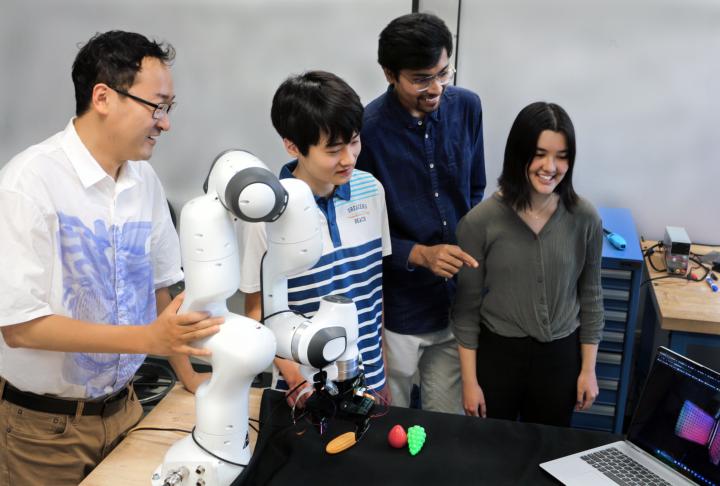Christian Hable and Matthew Zhu, two students from Walton High School in Marietta, Georgia, displayed an interest in engineering and robotics that began in early childhood when both explored designing and building with Legos.
In middle and high schools, Christian’s time competing in the Science Olympiad and Matthew’s time volunteering as a pianist at a senior living facility furthered their drive to explore how automation and robotics can assist humans from tasks as disparate as deep-space and planetary exploration to providing better living and care standards for the elderly.

Robotics professor Ye Zhao (GT-ME), high school intern Matthew Zhu, graduate student Chaitanya Mehta, and high school intern Christian Hable with the lab’s robotic arm with tactile sensors. Image credit: Christa M. Ernst / Georgia Tech
Over the summer of 2023, the two students served as research interns for Ye Zhao, Assistant Professor; School of Mechanical Engineering and a member of the Institute for Robotics and Intelligent Machines, and Ting Zhu, Woodruff Professor; School of Mechanical Engineering and a member of the Institute for Materials, both learning from the experience and proposing new research paths to their hosting lab team.
Mentored by graduate students Kelin Yu and Chaitanya Mehta, Christian and Matthew were introduced to the basics of robotic grippers with embedded tactile sensors and training via convolutional neural networks, a powerful artificial intelligence approach that imitates the way humans learn things.
After this introductory period, the pair proposed their own approach to testing the robotic gripper on various objects with different textures and shapes.
The two discovered that by changing several parameters of the neural network, they could increase the robotic arm’s precision so that it can more accurately identify the grasped object and adjust its force accordingly to hold the objects firmly but without breakage.
“Following an extensive period of learning and exploration, Matthew and Christian identified and proposed a novel research topic, followed by the development of a comprehensive research plan. Their proposed topic effectively integrates deep learning and tactile sensing to enhance the accuracy of object identification by robotic hands, “said graduate student and mentor Kelin Yu.
“They introduced a novel approach to object classification by utilizing deformations of grasped fruit objects and deep learning models. Moreover, Matthew and Christian played important roles in various phases of the research, including the intricate tasks of model training, meticulous data acquisition, and the execution of experiments on robotic hardware. Their active participation was pivotal in driving the project to successful completion.”
In addition to gaining new robotics skills, such as using SOLIDWORKS for design and modeling and 3D printing for prototyping, the two gained valuable insights into the importance of collaboration across specialized teams for productive research outcomes.
Before having this opportunity, I never would have imagined that so many specialized groups had to work together and communicate with each other. I would see the Cassie foot team members come in some days and they would discuss topics with the Robotic gripper team members Chaitanya or Colin. – Christian Hable
Georgia Tech has a cutting-edge research environment, such as at Professor Zhao’s lab, where research on robotics and artificial intelligence intersects. I am very impressed by how dedicated and hardworking my mentors, Colin and Chaitanya, were. Our wonderful research experience would not have been possible without the dedication of my mentors. – Matthew Zhu
Kelin, Chaitanya, Zhao and Ting are currently preparing a journal manuscript on the research, with Matthew and Christian as co-authors. The tentative title of the manuscript is “A robotic hand for object identification through tactile sensing and neural networks”.
Source: Georgia Tech

